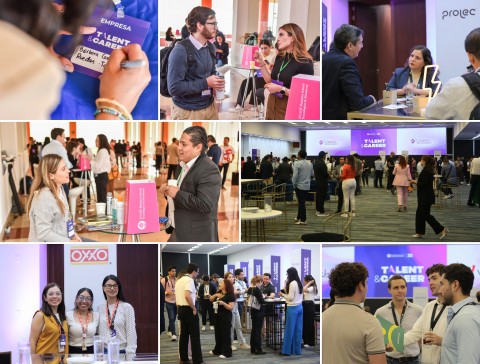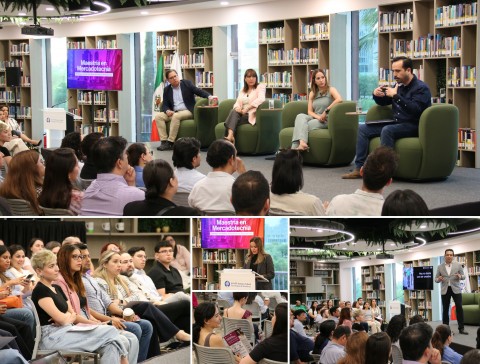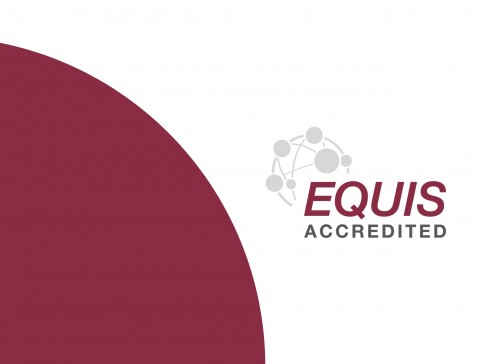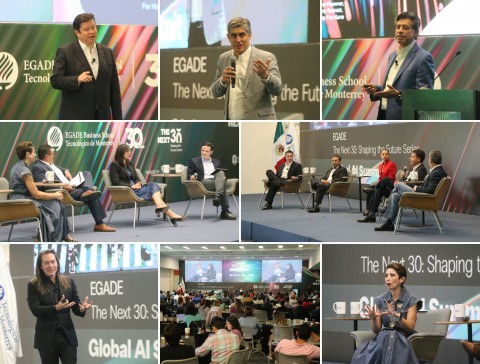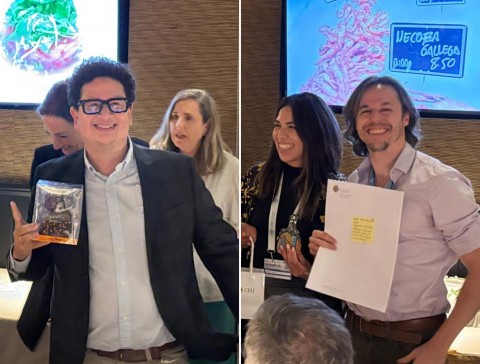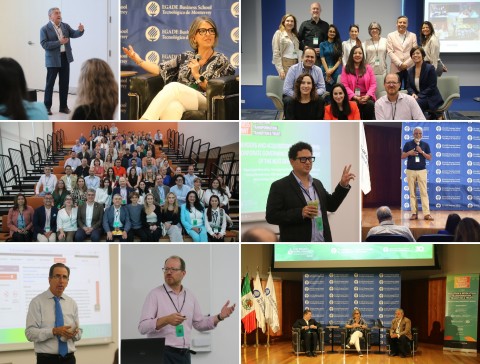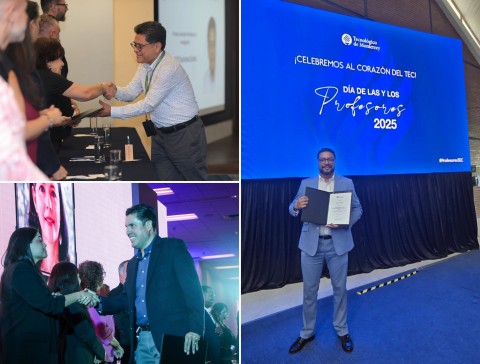Generative AI, digital transformation, and future leadership were the key themes of the event that brought together business leaders, tech experts, and academics in Monterrey.
By JOSÉ ÁNGEL DE LA PAZ | EGADE BUSINESS SCHOOL
EGADE Business School of Tecnológico de Monterrey hosted the Global AI Summit, an event held on May 30 in collaboration with the Digital Transformation Hub of Tecnológico de Monterrey, also serving as the opening event of EGADE U Week 2025: Leading With AI.
The summit, also part of the commemorative series The Next 30: Shaping the Future celebrating EGADE's 30th anniversary, convened business leaders, academics, and key players from the tech ecosystem in Monterrey to reflect on the strategic impact of generative artificial intelligence (GenAI) on business, leadership, and sustainable development in Latin America.
The event featured three keynote speeches and two expert panels. The welcome address was delivered by Horacio Arredondo, Dean of EGADE Business School, who emphasized the institution’s commitment to the future:
“At EGADE, we are committed to rethinking the future of business to make a positive impact on sustainable development in Latin America. This purpose drives us to challenge paradigms, engage with diverse sectors, and lead critical conversations like the one that brings us together today,” said Arredondo.
THE FUTURE OF GENERATIVE AI
Salvador Orozco, Regional Vice President for Hispanic America at Gartner, delivered the keynote "The Future of Generative AI," outlining a strategic outlook on how this technology is reshaping business and society.
According to Orozco, GenAI should not be seen as just another tool, but rather as a disruptive force comparable to the internet or mobile phones.
He shared three key Gartner predictions for 2028:
- By 2027, over 50% of GenAI models will be domain-specific (by industry or business function), compared to just 1% today.
- By 2028, over 60% of search engines are expected to be conversational and powered by GenAI, up from less than 20% today.
- That same year, GenAI-enabled virtual assistants are expected to automate 80% of the routine tasks currently performed by knowledge workers, which is currently estimated at 30%.
Orozco urged organizations not to imagine the future through the lens of today’s limitations, but to project themselves toward 2035.
“AI is redefining what it means to be human by introducing, for the first time, another form of intelligence besides us,” he stated.
He described GenAI as a partner, agent, and creative tool, capable of simulating scenarios, generating content, optimizing decisions, and democratizing creativity.
He cited applications in pharmaceutical research, legal analysis, and business model design, emphasizing that this technology is not intended to replace people, but to profoundly reshape job roles and give rise to new professions, such as the prompt engineer.
AI AS AN INTELLECTUAL REVOLUTION
Rafael Sánchez, CEO of Microsoft Mexico and President of CANIETI, in his keynote "Accelerating Transformation with AI," emphasized that GenAI is democratizing access to intelligence, opening unprecedented opportunities for millions.
“What was once a privilege of a few is now accessible to billions. AI does not replace humans; it empowers them. We are entering an intellectual revolution,” he said.
Sánchez explained that tools like Microsoft Copilot turn users into active agents of their knowledge and productivity. He noted that this technology redefines meritocracy and demands individual accountability for growth: “Every employee must become an AI expert.”
He outlined three levels of adoption:
- Ready-to-use tools (copilots);
- Low-code solutions for customization;
- Advanced models for complex development.
In all cases, he insisted, the starting point is education. “What matters is not who arrives first, but that we all get there,” he concluded, urging swift and collaborative action: in this new era, those who learn and adapt faster will survive.
LEADERSHIP IN THE AI ERA
Mike Walsh, CEO of Tomorrow and global futurist, delivered the talk "Redefining Leadership for the AI Era".
For Walsh, leadership in the AI era must focus on managing human change, not just forecasting emerging technologies.
“The AI revolution is not technological—it is economic and social. The future is what we choose to build,” he said. “Our hands are on the cables. We can intervene, influence, and decide the course AI will take in our organizations and societies.”
Walsh identified three major shifts:
- From products to platforms: Organizations are transforming products into digital platforms.
- From transactions to experiences: AI will enable personalized experiences that shift focus from price to perceived value.
- From applications to agents: Autonomous AI assistants will replace traditional apps.
He argued we are in a fifth industrial revolution, drastically lowering the cost of decision-making. “It’s not just about automating processes—it’s about elevating human potential. The leadership challenge is managing a hybrid workforce where humans and digital agents coexist,” he noted.
He also warned that sustainability will evolve: “Tokens will become the new efficiency metric, and companies will need to produce them with low energy use to remain competitive.”
Walsh concluded with three keys to future leadership:
- Automate to elevate.
- Design work, don’t just work.
- Manage uncertainty with curiosity.
“The real competitive edge won’t be who has more AI, but who knows how to apply it with human judgment,” he emphasized.
AI IN PRACTICE: LESSONS FROM LATIN AMERICA
The panel “Generative AI in Practice in Latin America” featured Mauricio Torres, CEO of IBM Mexico; Felipe Bueno, Global Director of Digital Services and eCommerce at CEMEX; Francisco Moreno y Rojas, VP of Administration and Strategic Planning at CNBV; and Alejandro Suárez, CIO at Sigma Alimentos, moderated by Alexandra Solano, Head of the Digital Transformation Hub at Tecnológico de Monterrey.
Torres noted, “The speed is such that there’s no time for disillusionment,” emphasizing that the main barrier is not technical but human: “The problem is not technological—the main challenge is people’s fear of changing how they work.”
Bueno explained that success at CEMEX came from building trust with visual tools called Magic Tools. Suárez stressed that today’s shift is not digital transformation, but continuous digital evolution. Moreno shared how CNBV migrated to the cloud to process large volumes of regulatory data using AI.
NEW LEADERSHIP FOR A NEW CONTEXT
The panel “Leadership Forum: Present Applications and Future Possibilities” featured Ángela Gómez, COO of Grupo AXO; Ivone Mejía, Commercial Director of Solutions at Microsoft Mexico; and Luis Villanueva, VP of Global Services at Capgemini, moderated by Osmar Arandia, Associate Dean of Executive Education at EGADE.
Gómez outlined five key leadership competencies: AI literacy, risk management, technical training, cross-functional collaboration, and alignment of technology with business goals. “AI is not going to replace us—it should make us smarter,” she said.
Mejía emphasized that the region’s biggest challenge is cultural: “AI is democratizing the ability to transform companies and lives. But it starts with believing in its potential.” Villanueva highlighted the need for ethical adoption, including the creation of business ethics committees ahead of formal regulation.
With the Global AI Summit, EGADE Business School reaffirms its commitment to leading thought and action on strategic topics such as artificial intelligence, sustainability, and business transformation in Latin America.
